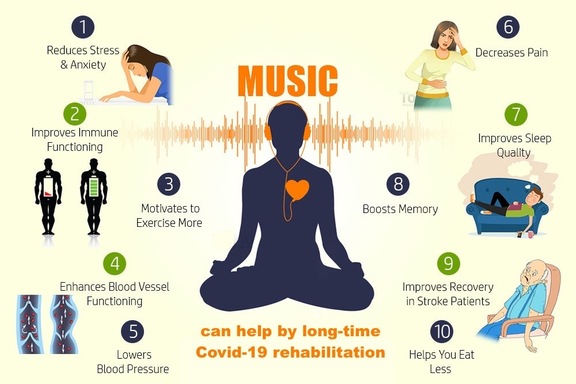Listening to music can help boost your mood, reducing stress levels and making you feel happier and more energetic.
Finding music that brings joy and relaxation is essential. Avoid listening to anything that irritates you, as this will only heighten tension levels further.
Relaxes Your Mind

Studies have demonstrated that listening to music can improve focus and Concentration, helping ease stress. Music also rechannels negative thoughts, boosts overall mood, and lessens anxiety/depression symptoms.
Studies involving subjects being stressed and then either listening to music or doing nothing showed that those listening to it experienced less arousal post-stress, likely because soothing music can lower breathing and heart rates, thereby helping reduce tension levels.
Musical rhythms and beats can give you a sense of control over your emotions. Engaging in musical activities such as drumming or singing can provide an outlet to release feelings contributing to stress levels.
Calming music can help relax both mind and body, increasing sleep quality. Indeed, many people use music as part of their bedtime ritual to fall asleep faster and experience better restful nights’ rest.
Making a playlist of relaxing songs and sound effects can help manage stress when focusing or concentrating. Select music with a slower tempo, calming melodies, and natural sounds such as rain or thunder – avoid lyrics-containing tracks as these could become distracting and overstimulating.
Remember that while music can help regulate and shift your emotions, it should never replace professional mental health treatment. If your feelings become uncontrollable or overwhelming, always seek professional assistance immediately. However, using music to focus and calm the mind can empower you to manage daily stressors such as road rage or interview anxiety with greater ease and less damaging thought processes.
Improves Concentration

Music can provide the ideal aid for Concentration, making it easier to focus on tasks and enhance study and work performance. Music also can reduce distractions like noise from other people or your mind, helping you concentrate more efficiently and focus on the tasks.
Music can create the desired emotional state, whether relaxing or focusing on an activity. Each person’s musical tastes vary; some might find soothing tones while others could become distracting, so finding what works for you is critical. Experimentation with different songs and sound effects may lead to finding what suits your study or work needs best.
Soft instrumental music can be an excellent way to manage stress. This genre typically features slow tempos and soothing melodies that help soothe your mind, such as classical piano pieces, Native American drumming, or rain or thunder sounds. Try ambient or meditation music as a means of focusing.
Listening to music can activate both sides of your brain at the same time, which helps speed up learning. By wearing headphones to block out external noise and enhance concentration capabilities, music listening can greatly facilitate rapid progress.
Music can also help combat lethargy when concentrating on an arduous task. However, this method will not address its sources, such as lack of Sleep, poor health, or non-conducive environments – the best remedy in such instances would be addressing these underlying factors before focusing on music as an aid.
Decrease Stress Hormones

Research has demonstrated that music can lower cortisol levels in your body, a stress hormone that suppresses immunity. Furthermore, listening to music has also been proven to increase dopamine levels, creating feelings of happiness and relaxation.
Integrating music into your daily routine is an effective way to manage stress. Music can help relieve anxiety during the day or soothe before sleep time, or you could use music as a motivating force that boosts motivation and productivity at work or school.
Soft instrumental music can be particularly helpful in alleviating stress, as its slower tempo and absence of lyrics make it less likely that lyrics would distract or increase anxiety levels. Studies have also demonstrated how songs directly impact heart rate, blood pressure, and breathing – in one such study; participants performed stressful tasks while listening to Marconi Union’s “Weightless,” their heart rates and blood pressure immediately decreased significantly, helping them relax more.
Your experience and preferences are the best indicators of what types of songs and sounds can help reduce stress, so experiment with various genres until you discover what works for you. Compose music that expresses your emotions while relieving tension – perhaps playing rhythm instruments like drums or rain sticks may release endorphins, which help make you happy, while singing also releases endorphins while relaxing you; alternatively, you could try learning an instrument and creating your music instead!
Improves Immune System

We all know that music has an incredible emotional impact and can help lift us when times get rough, but did you also know it can boost immunity levels and promote improved sleep patterns?
An Annual Research & Review in Biology study suggests that playing and listening to music can powerfully and positively affect your immune system by decreasing symptoms of stress. Researchers discovered that performing musical activities, like singing and instrument playing, increased antibodies in the body while simultaneously reducing cortisol levels. Although our immune systems don’t get much attention these days, they still play an essential role in maintaining physical well-being – perhaps classical music could provide just what’s needed when you need a way out. If this sounds intriguing and you need something soothing before bedtime – try turning on some classical tunes.
Music has long been used as a powerful means to manage our emotions, yet only recently have scientists begun studying its effects on both bodies and minds. Researchers such as Daniel Levitin have reviewed hundreds of scientific papers linking music with brain changes like improved immune system function and reduced stress; one study even demonstrated that listening to music may be as effective at alleviating anxiety as taking prescription drugs.
Different genres of music can have other impacts on our bodies and minds, so we must listen to a style that best meets our individual needs. Classical is one of the most soothing genres, with its slow tempo and soothing melodies. However, you may also find comforting music from jazz or nature sounds genres; finding one that works for you is vital!
Improves Sleep

Music has long been used to both invigorate and soothe. Drums pounding and bugles blaring have helped soldiers prepare for battle, while gentle lullabies have long alleviated fussy babies. Now we know that listening to soothing music can help adults sleep more soundly at night – great news for anyone experiencing difficulty falling or staying asleep, as this may reduce the need for medications to treat insomnia.
Studies have demonstrated the power of music to improve sleep quality by modulating certain hormones, particularly cortisol – the stress hormone responsible for increasing tension and leading to poor restful Sleep. Studies also show that relaxing music reduces cortisol levels, helping individuals feel more at ease and relaxed.
Before bed, choose songs with slower tempos that you find soothing and pleasurable when selecting music to listen to. Avoid pieces that elicit strong emotional reactions as these may elicit the fight-or-flight response in your mind and prevent Sleep. Integrating this type of music into your evening routine, such as bedtime rituals, or using an app with relaxing music and nature sounds may help.
To maximize the effects of sleep-inducing music, it’s best to listen with headphones to block out any outside sounds that might interfere with restful slumber. Focus on taking deep breaths while the tunes play over you – make this part of your routine and monitor how it affects you over time.
Music Can Enhance Memory and Learning

According to numerous studies, listening to music has an enormously positive effect on memory and learning. Studies have revealed that specific types of music can increase cognitive function while aiding information retention. This phenomenon is known as the “Mozart Effect,” listening to classical pieces composed by Wolfgang Amadeus Mozart may temporarily boost spatial-temporal reasoning and memory skills.
Listening to Music While Exercising
Music can have a tremendous effect on exercise performance. Energizing and motivational music can improve mood, reduce perceived effort, and increase endurance; many athletes and fitness enthusiasts use carefully-selected playlists during workouts to keep themselves inspired and motivated.
Music Fosters Emotional Release and Expression

Music has an incomparable way of connecting with emotions and providing a means of expression. If you are overwhelmed or experiencing strong emotions, listening to music that speaks directly to those feelings may provide comforting solace and help facilitate emotional release and catharsis.
Strengthen Social Bonds
Music can bring people together and strengthen social ties in remarkable ways. Whether attending concerts, singing in choirs, or simply jamming with friends – shared musical experiences create a powerful sense of unity and camaraderie between participants.
Listening to Music Can Stimulate Creativity

Music has long been a powerful medium to help stimulate creativity and spark innovative thought processes. Different genres and melodies elicit different emotional responses, providing fresh inspiration during creative processes. Many artists, writers, and other creative thinkers rely on musical inspiration in their creative processes.
Conclusion: Music is an incredible force that can dramatically change various aspects of our lives, from relieving stress and improving mood to enhancing Concentration and strengthening immunity – the list goes on! By including music in daily routines and paying attention to which types of songs speak to us personally, we can harness its therapeutic potential and improve overall well-being and quality of life. Don’t hesitate to hit play and allow the magic of music to take its course!












